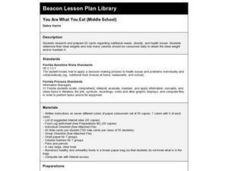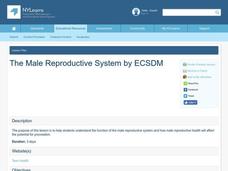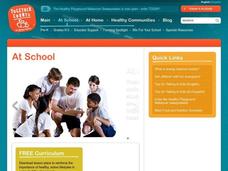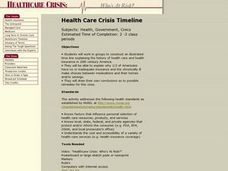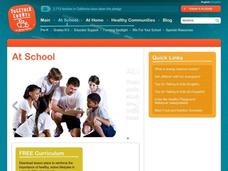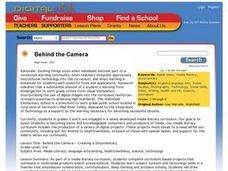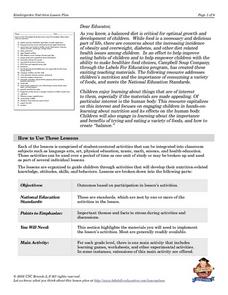Curated OER
You Are What You Eat (Middle School)
Third graders determine what their ideal weights should be and how many calories should be consumed daily to obtain the ideal weight and/or maintain it. They research and prepare 20 cards regarding nutritional needs, obesity, and health...
Curated OER
The Male Reproductive System
Young scholars name the different parts of the male reproductive system. In this health science lesson, students research health issues affecting the male reproductive system. They create a presentation and share it to class.
Curated OER
What's In Your Grocery Bag?
Students explore the global implications of consumer decisions when purchasing groceries. They examine labels of food products and discuss the wording on the labels. They calculate food miles of how far each ingredient in foods has...
Curated OER
I Can Balance. You Can Balance.
It's disturbing to think that one third of children born after the year 2000 will suffer from diabetes and perhaps be the first generation to live shorter lives than their parents! Too many youngsters are not eating properly and are not...
California Academy of Science
Rapid Brainstorming: How Can We Improve Our Global Food System?
In 2018, the average fast food burger cost $2.64 while a salad averaged $4.14. Does the price difference matter to public health? Scholars consider that question and others in a brainstorming session about improving our global food...
Curated OER
Anyone for Sugar?
Pupils inquire about how much sugar they consume on a daily basis. In this healthy habits demonstration, students examine how much sugar is in a variety if foods by spooning out teaspoons and placing into a bowl. Pupils discuss...
Curated OER
Health Care Crisis Timeline
Young scholars work together to develop a timeline showing the history of the health cary system. They examine why so many Americans do not have health insurance. They create their own solutions to this problem.
Curated OER
Calorie Countdown
Students identify the advantages of a healthy diet and exercise plan. In this health activity, students bring in labels of different food products and calculate the amount of calories each serving is. Students keep a food diary to keep...
Curated OER
Nutritional Needs
Students determine caloric needs for an active person and what role nutrition plays in one's energy, In this nutritional needs lesson, students discuss the definition of calorie and identify high calorie foods. Students work through...
Curated OER
"Study Finds Soft Drink Consumption Up, Health Down"
Students compare the nutrients in soda with those in milk after reading an online article. They identify micronutrients that are important in the teen years and those that help stave off disease.
Curated OER
Hunger in the World
Background information is a great tool for any teacher. This resource provides background information on nutrition and world hunger, as well as ten different activity options to help learners understand this global issue. Each activity...
Curated OER
Why Be Active?
Are there benefits to being physically active? Yes! There are both short-term and long-term benefits! Being physically active doesn't just have strengthen you physically, but also emotionally and socially. Learners find out how to...
Curated OER
The Hope to Cope: Coping Skills
Explore how to weigh the value of positive and negative coping skills in life situations with middle schoolers. They will be able to recognize the coping skills that they have used that been negative ways of coping with stress and look...
Curated OER
Where's the Beef - Beef Facts or Hype, Is it Bad for You?
Analyze a Happy Meal™ for nutrient content and calories. Blend the contents into "McMush" and use Biuret's solution to test for protein content. There are a few problems with the lesson plan: the resource links are no longer valid, the...
Curated OER
Behind the Camera
Scholars, in groups, gather information relating to community health care. Using video and digital cameras, they interview members of a health center staff. They then compile digital images, select music, and narrate a story about their...
Curated OER
I Can Balance. You Can Balance.
There are many, many reasons why people do not maintain an energy balance. Talk to your young learners about balance, what gets in the way of eating healthy, and things that get in the way of doing physical activity. Some obstacles may...
Curated OER
Nutrition Lesson Plan
Third graders explore a variety of breakfast foods and beverages and write a creative story about their favorite. They then present their stories to the class and are encouraged to try different foods during the story time.
Curated OER
The ABC's of Breakfast
Students identify the food group of various culturally diverse breakfast foods and discuss the importance of eating a healthy, well-balanced breakfast every morning. They then try different foods that begin with the letter A, B and C and...
Curated OER
A New coat for Anna
Second graders participate in a bartering activity. They discuss the problems of bartering. Students read the book "A New Coat for Anna," by Harriet Ziefert. Students discuss the bartering Anna's mother did. They record the trades made...
Curated OER
Incentives, Profit and the Entrepreneur
Students discuss hypothetical problems associated with price and profit. They discuss the fairness of profit, how it should be measured, and the consequences of setting acceptable levels of profit.
Curated OER
Being an Educated Consumer of Statistics
Students examine kinds of data used to report statistics, and create their own statistical report based on any of the four sources of media information (Internet, newspaper, TV, magazine).
Curated OER
Fertilizers, Pesticides and Health
High schoolers apply real data to create and calculate algebraic equations. Students create a visual to represent the concentration for one part per million and apply unit analysis to verify measurement computations. High schoolers...
Curated OER
Will Biotech Crops Solve World Problems?
Pupils read an online article to examine what biotechnology and agricultural biotechnology are. They answer questions and complete worksheets based on the article's information.
Global Oneness Project
Deconstructing Consumerism
To increase awareness and launch a discussion of consumerism, class members view What Would It Look Like, a 25 minute film of images that capture the global effects of the consumption of goods. Viewers make a list of the images that they...


